Boosting your search engine visibility and organic traffic comes down to impeccable keyword research. This ultimately leads to better keyword optimization, which helps you climb the totem pole and appear more often in SERPs. However, doing this manually is pretty complex. Impossible even. For this reason, many opt for keyword research tools.
They help you find keyword suggestions, easy-to-rank keywords, and even backlink opportunities for added convenience.
Many still think you need to pay a small fortune for a quality keyword research tool. Well, they’re wrong. In this article, we’ll present to you our favorite free and paid keyword research tools for 2025. You’ll see how awesome they are and cost nothing or very little.
We’ll also give you some basic tips on how to use them to further help you out. Finally, we’ll explain our criteria for selection and some of the things we took into consideration when making our list. It’s an interesting read, so give it a go.

The Top 10 SEO Keyword Research Tools at a Glance
Readers in a hurry will appreciate a shortlist of the top 10 tools for SEO keyword research. For those unwilling to go through the entire guide, here’s a list of our 10 favorite tools in 2025.
- Semrush – best keyword research tool overall
- SE Ranking– best keyword research tool on a budget
- Ahrefs Keyword Generator – to discover KW ideas and questions
- Jaaxy – tons of free suggestions
- QuestionDB – great for finding related questions
- Moz Keyword Explorer – handy insights with a few phrase suggestions
- Google Keyword Planner – accurate first-hand keyword data
- Mangools KWFinder – an affordable option for all-around SEO needs
- KeywordTool.io – keyword research on multiple search engines
- AlsoAsked – in-depth keyword clusters with a mind map
Best SEO Keyword Research Tools in 2025
Without wasting a second more of your time, we’ll discuss our favorite keyword research software.
On this list, you’ll find a couple of free and paid choices, all tested and used by our team daily. We’ll review each promptly and see what they have to offer.
1. Semrush
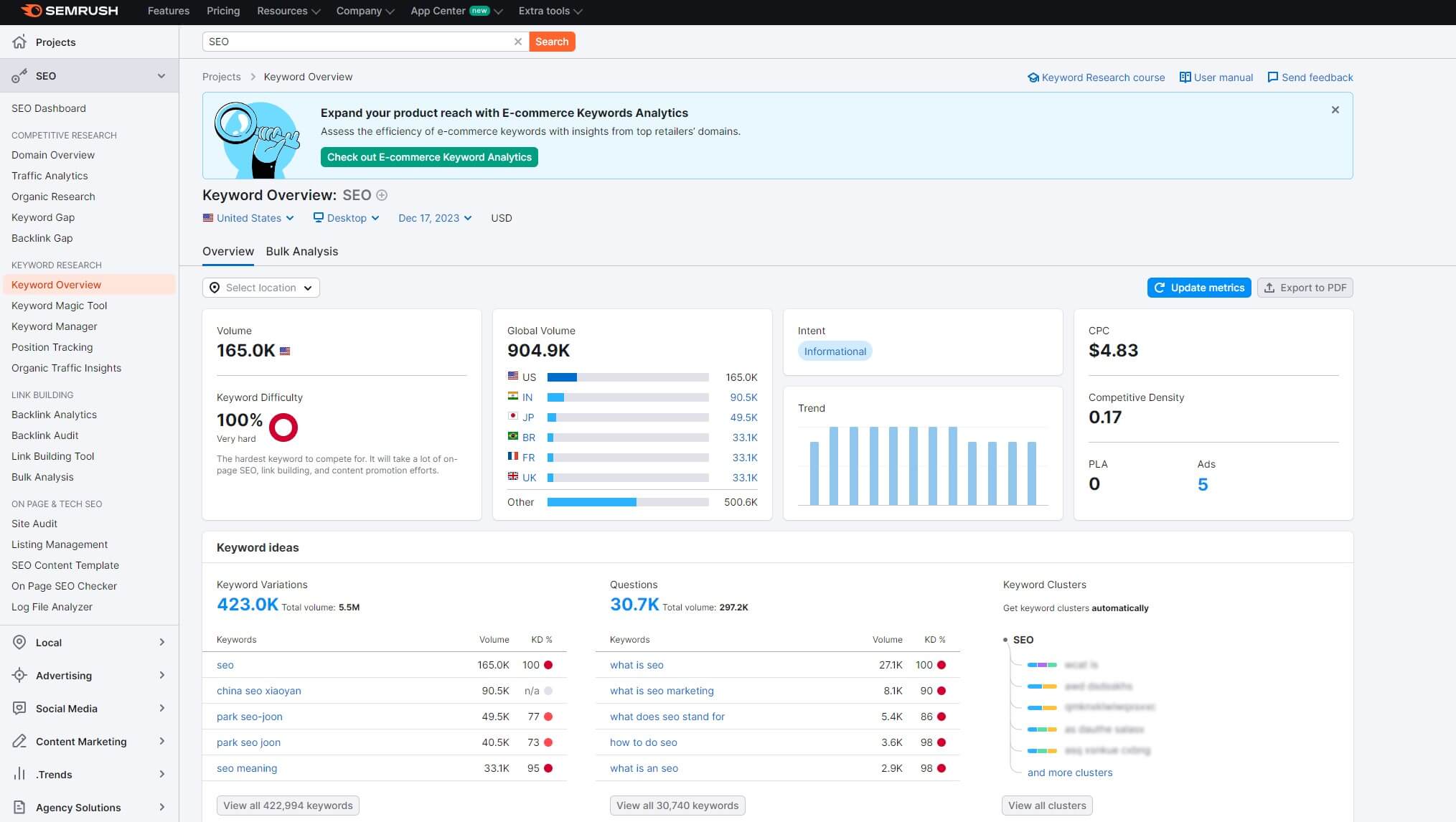
When it comes to SEO keyword research, Semrush is the best tool in general.
It’s a paid option but it includes more than a few tools to help you out. The first is the Keyword Overview option where you can analyze each keyword and get valuable info.
This means discovering search volume, difficulty, CPC, and suggestions/questions.
However, our favorite is the Keyword Magic Tool. Here, type in the seed keyword, and Semrush will come up with thousands, if not millions of keywords in just a few seconds.
We like this tool because it lets you apply the language filter and discover new phrases for your local site that might not be in English. Moreover, the Keyword Magic Tool allows you to discover longer, more specific keyphrases that can convert better.
That’s not all, as Semrush offers the Keyword Manager option. It creates clusters of phrases that cover different topics based on the provided key phrase. Volume, difficulty, and other parameters are included, letting you see whether the topic is worth covering.
The final option from Semrush is titled Keyword Gap. It enables you to compare your domain to four others and see which keywords they rank for but you don’t. This is nifty for including their ranking phrases in your content and competing with your rivals for them.
As you can see, Semrush is a paramount keyword research tool that can work independently. No need to complicate things with other tools when you have an all-in-one digital marketing suite. Claim your 14-day FREE trial on Semrush and start your keyword research now.
2. SE Ranking
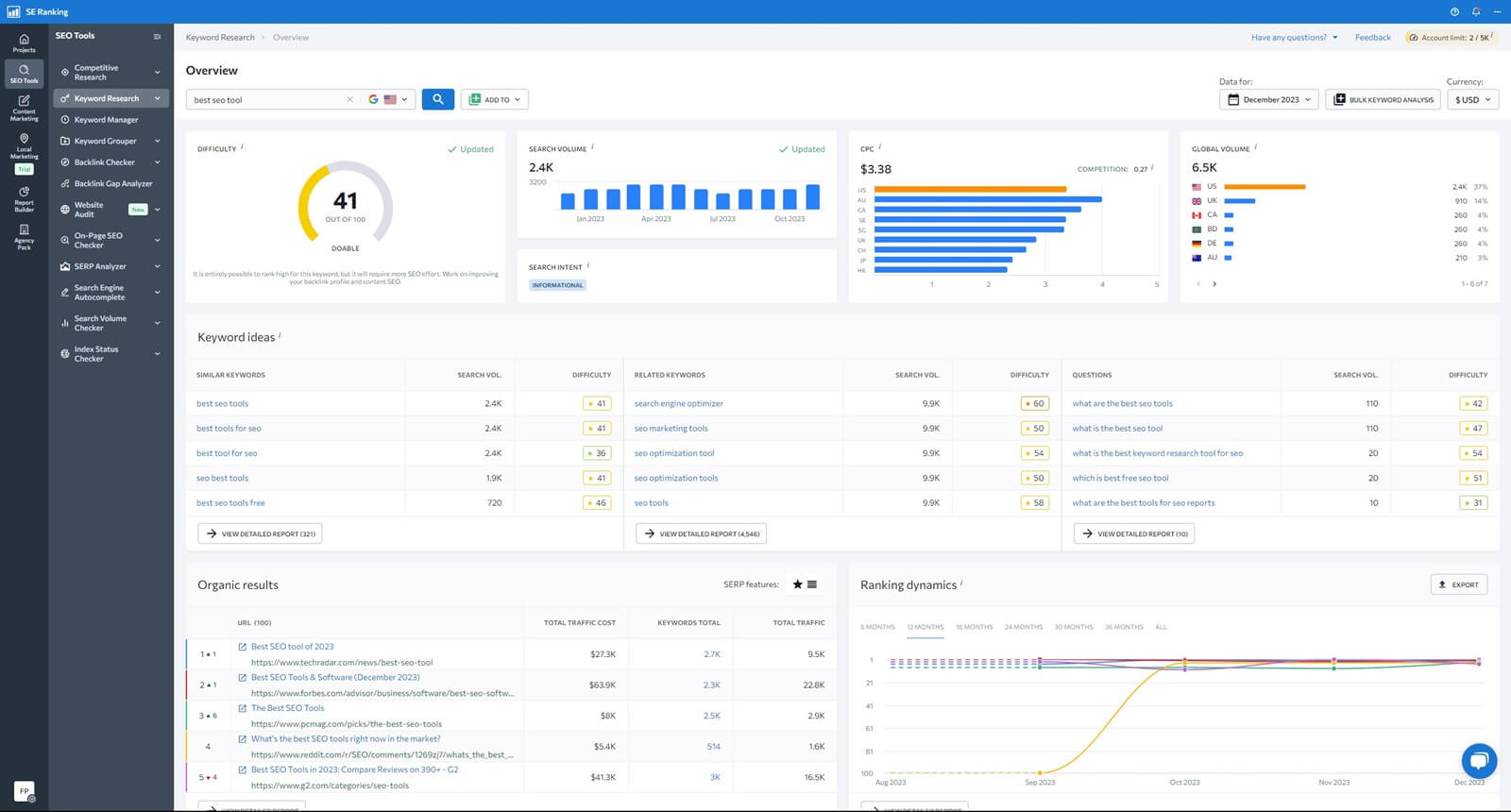
SE Ranking is very similar to Semrush in terms of keyword suggestion capabilities.
You can use the Overview tool to find out more about the search volume in the selected country. SE Ranking is also great for PPC research and displays difficulty and CPC for each phrase.
We like its numerous keyword ideas and questions that can be useful for creating in-depth content and covering a specific topic. Like Semrush, it has this Keyword Grouper tool that will create clusters of keywords based on the SERP result similarity.
Additionally, the Keyword Manager option allows you to track a specific phrase list and monitor rankings for a comprehensive overview. Speaking of tracking your domain ranking, this service is thorough and accurate, with daily updates to keep you informed.
SE Ranking is very easy to use and sports many other features, such as Content Marketing, where you can create content with SE Ranking’s AI. The service offers various Audit functions that will aid your search engine optimization and improve overall ranking.
Compared to Semrush, SE Ranking lacks the Keyword Magic Tool – or at least an equivalent. However, its price is very affordable and the tool offers a 14-day free trial without providing your credit card information. You can, therefore, use this keyword research tool for free.
Sadly, it lacks a proper free plan, so once the trial expires, you must buy it. This shouldn’t be an issue, as it’s the most affordable keyword suggestion tool of this caliber. Using the button below, you can obtain a discount on it and start your search engine optimization journey.
3. Ahrefs Keyword Generator
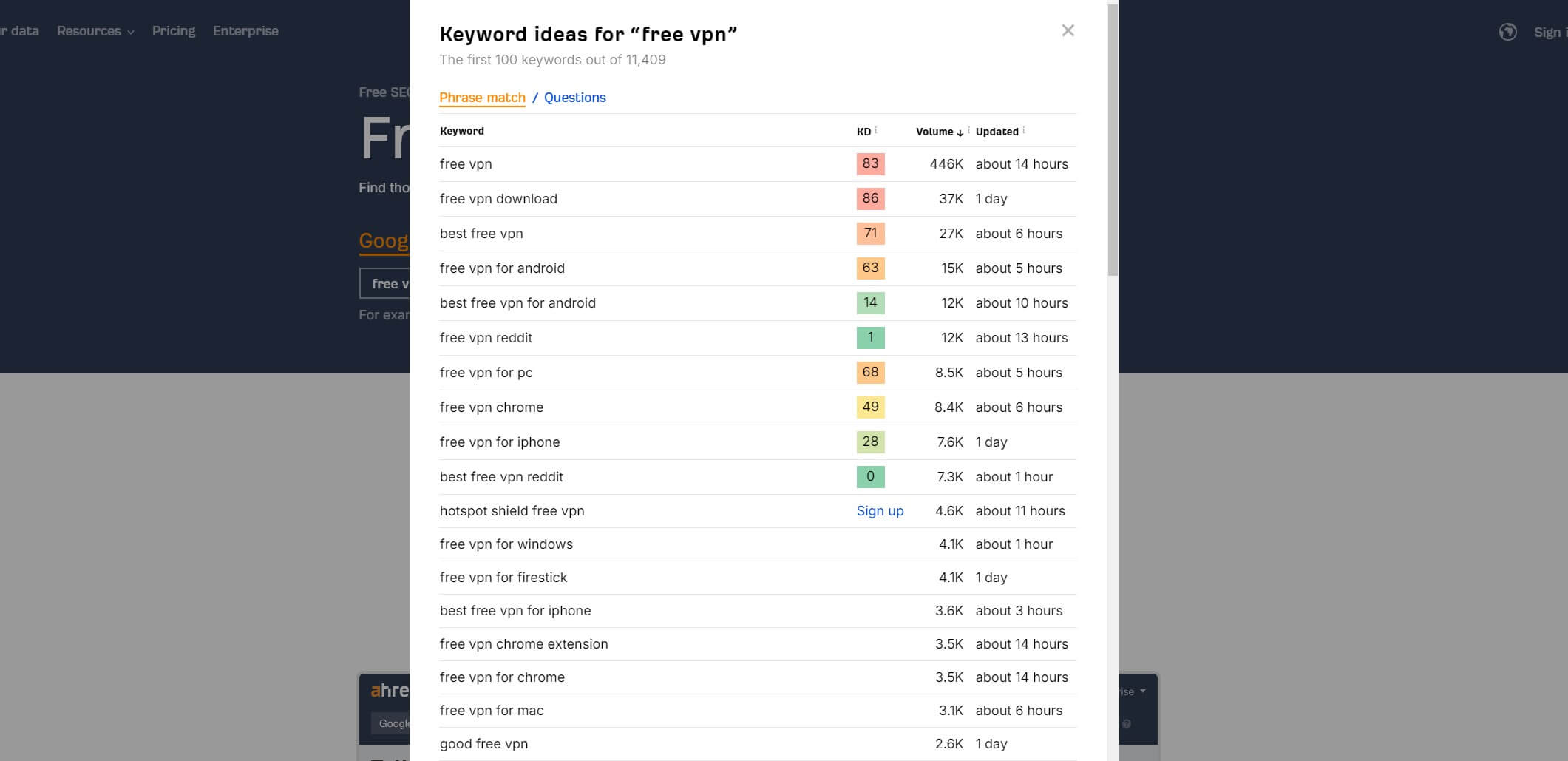
Ahrefs also has a free tool titled Keyword Generator. For a free tool, it’s incredibly capable of generating thousands of keyword suggestions for different search engines. These include Google, Bing, YouTube, and Amazon.
You’re required to enter a term, select the country, and find insightful suggestions. Ahrefs will display the terms with the phrase match, along with difficulty and volume. Bear in mind that Ahrefs is very precise and its difficulty score is often used as a benchmark.
Moreover, Ahrefs allows you to discover questions related to the keyword, which helps create and organize FAQs in your blog posts. This free tool will pump out dozens of suggestions but you’ll see volume/difficulty data only for the first 10.
Regardless, Ahrefs Keyword Generator is one of the simplest keyword research tools we used so far. It works limitlessly and you can search for as many phrases as you want. However, we still prefer Semrush as an Ahrefs alternative given its more robust KW research abilities.
In its paid version, Ahrefs is way more powerful but also opulent due to its credit system which was met with extreme criticism.
That’s why Semrush and SE Ranking are better premium options for keyword research and everything else.
4. Jaaxy
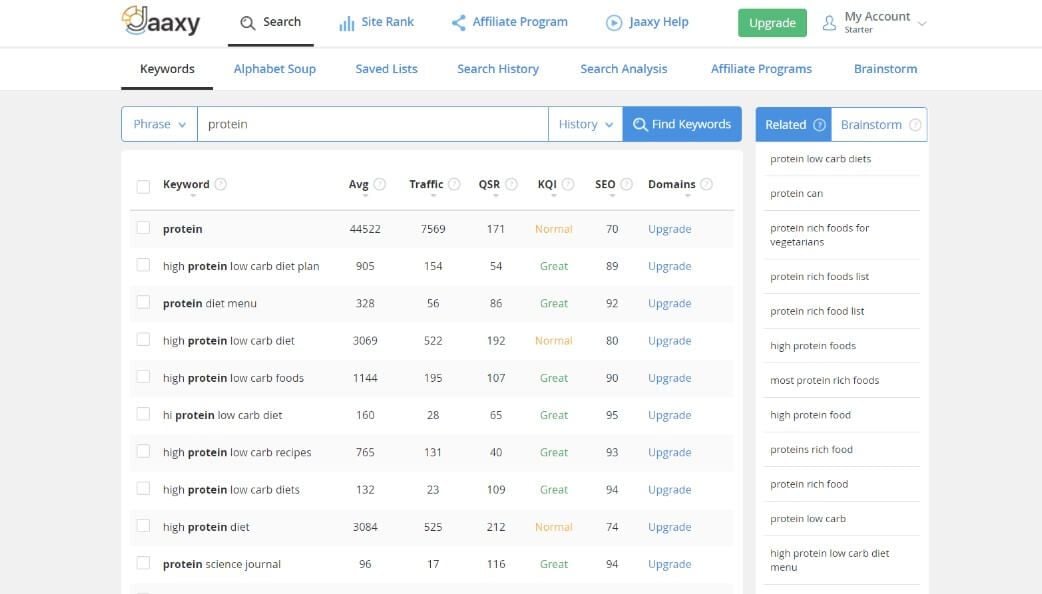
If you’re looking for valuable keyword suggestions and you’re in a hurry, here’s Jaaxy.
This tool spews out hundreds of related phrases in seconds. Even better, it gives you information about traffic, difficulty, and other SEO-related parameters.
It’s a paid tool by default but you can use it for free. Once you sign up, you’ll get 30 FREE searches, which is amazing given Jaaxy’s 500 million keywords in the database. The tool is incredibly simple to use as well. Step one – create your account.
Step two – enter the seed keyword and voila! Jaaxy includes a few unique metrics, such as QSR, which stands for Quoted Search Result. This metric explains how many sites are trying to rank for the phrase, so the lower value of this metric is always welcome.
What’s more, compared to Semrush and SE Ranking which focus primarily on Google, Jaaxy includes Yahoo and Bing as supported search engines.
This means you can improve your ranking on these two and build your online presence elsewhere, not only on Google.
5. QuestionDB
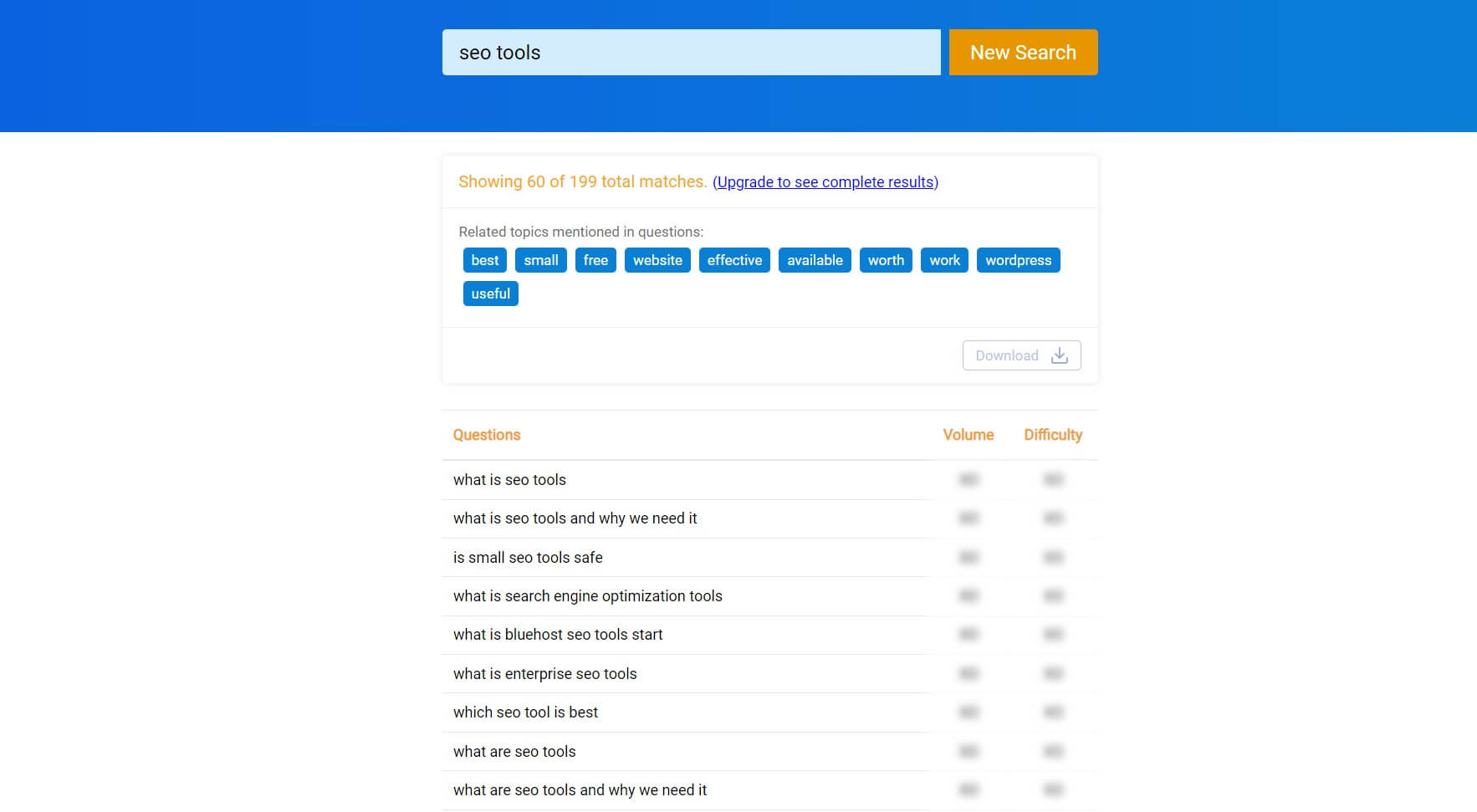
QuestionDB is another nifty little SEO keyword research tool we tested. It’s free, although it offers two affordable plans. However, we think its free plan is more than great. QuestionDB is all about discovering relevant questions based on the provided term.
Go to its site and enter 1-3 words about the subject you’re looking to cover. Let’s say you want to cover the best SEO tools. Type in the term, click on Search, and in 5-15 seconds, QuestionDB will show you related questions, alas, without volume and difficulty.
These two are reserved for paid users. Still, QuestionDB came back to us with 55+ questions for this search query, which is impressive for a free keyword research tool.
Furthermore, you can download all keyword suggestions in the form of an Excel sheet.
Then, you can use these sheets as a reminder to include the given terms. QuestionDB’s Solo plan starts at $12.5 a month and gives you complete results with 100 searches per month. It’s not a very high price, yet, the tool can help make FAQs and how-to guides effectively.
6. Moz Keyword Explorer
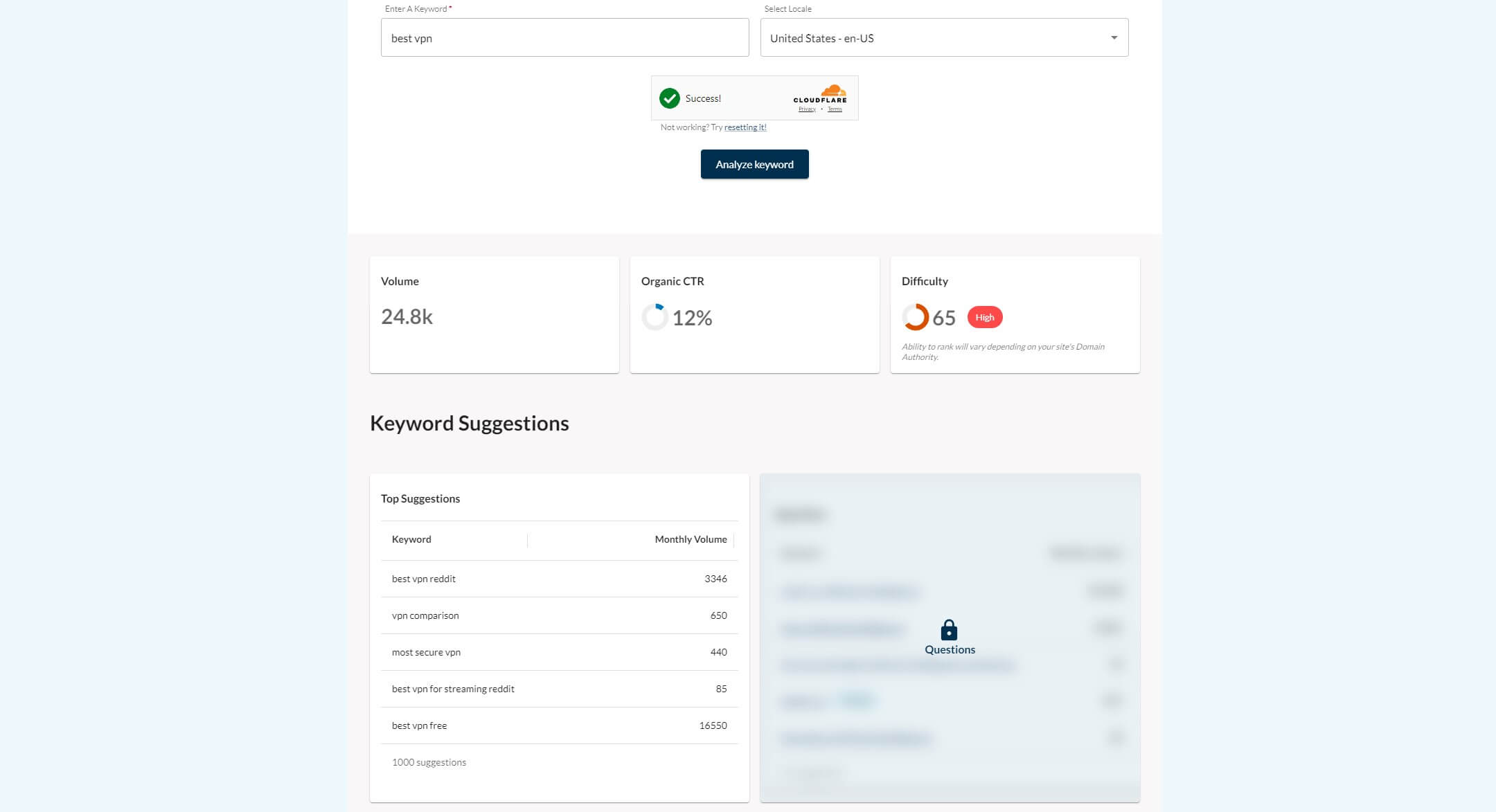
Next to Semrush and SE Ranking, Moz is another highly valuable keyword research software. Moz will cost you money but not always, as it has a plethora of free tools that you can check out. One of them is Moz Keyword Explorer – one of our favorite choices on this list.
This tool allows for 3 searches per day, allowing you to analyze keywords with the location filter. Select the location, provide a keyword, and get information about its organic CTR, difficulty, and volume – simple and standard stuff.
Moz Keyword Explorer includes a few suggestions with their monthly volumes, alas, it misses SERP analysis and other crucial information until you sign up. The good news is that Moz’s suggestions are insightful and closely related to the terms you provided.
Also, its organic CTR metric shows you how many clicks are expected for the given phrase if the domain makes it to the top 10. With the other aforementioned data, you can determine whether it’s worth “chasing” that keyword and ranking for it.
Moz is simplistic and won’t overwhelm you with data, but everything you get will be valuable.
Read our Moz vs Semrush comparison to find out more about it and see how it stacks against our #1 keyword research tool.
7. Google Keyword Planner
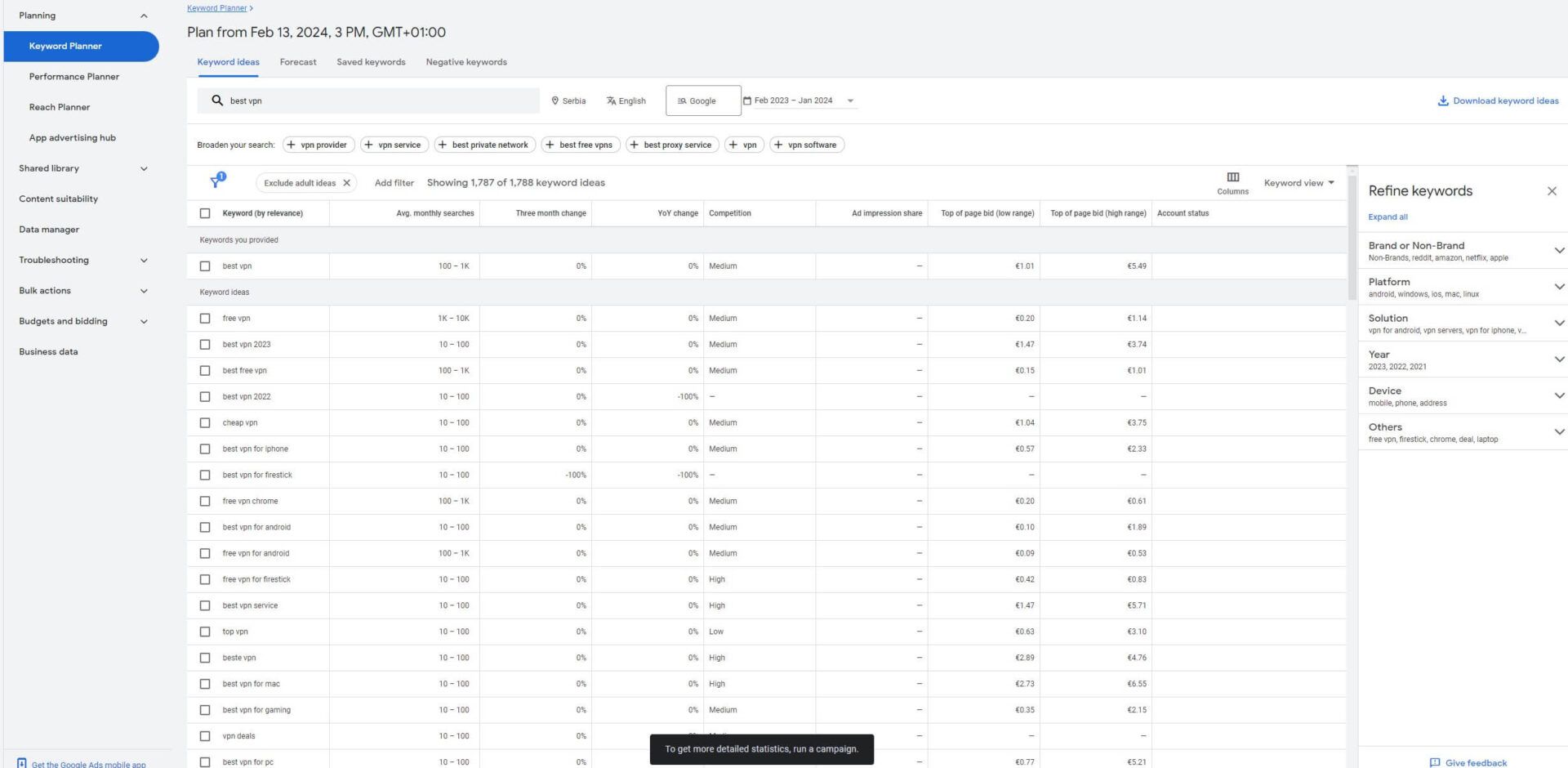
Who else to ask for help than Google? Google’s keyword database is humongous, letting you get 100% accurate and genuine information directly from it.
The tool is, however, simplistic compared to Semrush or Moz and won’t drown you in information.
At least, Google Keyword Planner is intuitive and allows you to discover a heap of suggestions. Type in the phrase and it’ll come up with more than a few ideas with their average monthly searches and level of competition from low to high.
Users can also see the “top of the page bid” parameter, which shows them how much advertisers are bidding on a specific term. If you’re looking to improve your earnings through PPC, finding more profitable keywords should be a breeze.
This tool is free like all SEO software from Google. You can combine it with Google Search Console and perform frequent SEO audits to ensure your website has proper optimization for better ranking. All in all, a nifty tool for SEO keyword research and suggestions.
8. Mangools KWFinder
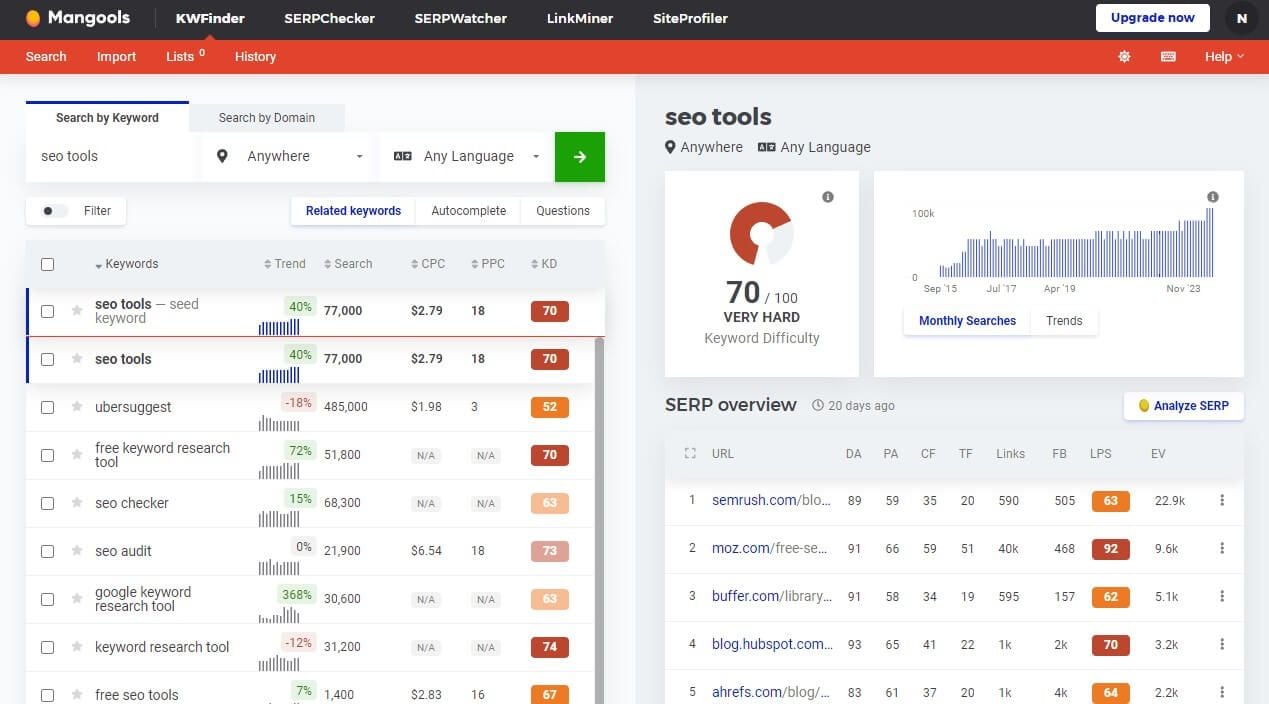
Mangools is known for its rich palette of digital marketing tools, making it easily one of our favorite picks for keyword research.
Its KWFinder is perhaps the most intuitive and straightforward keyword research tool in 2025. Apart from displaying suggestions, it’s great for finding long-tail keywords known for improving ranking.
Another perk is the option to see keyword difficulty for each suggestion, which lets you know if it’s worth ranking for. KWFinder supports 52,000+ locations and more than 15 languages. Something we found handy for a few of our non-English sites.
Mangools KWFinder looks stunning and lets you find many keyword suggestions based on your domain. You’ll need to provide your domain address and based on your content, KWFinder will list hundreds of ideas for you to target.
If not, type in one phrase and let the service analyze it. This is a free tool and with a free account, you can perform a few searches per day. The Entry plan at $19.9 a month is affordable and allows for up to 25 keyword lookups daily, which isn’t bad.
A subscription grants you access to other tools that Mangools has. You can use its SERPChecker for SERP analysis or LinkMiner for backlink analysis all in one plan. It’s not reinventing the wheel but remains one of the best keyword research tools in 2025.
9. Keyword Tool
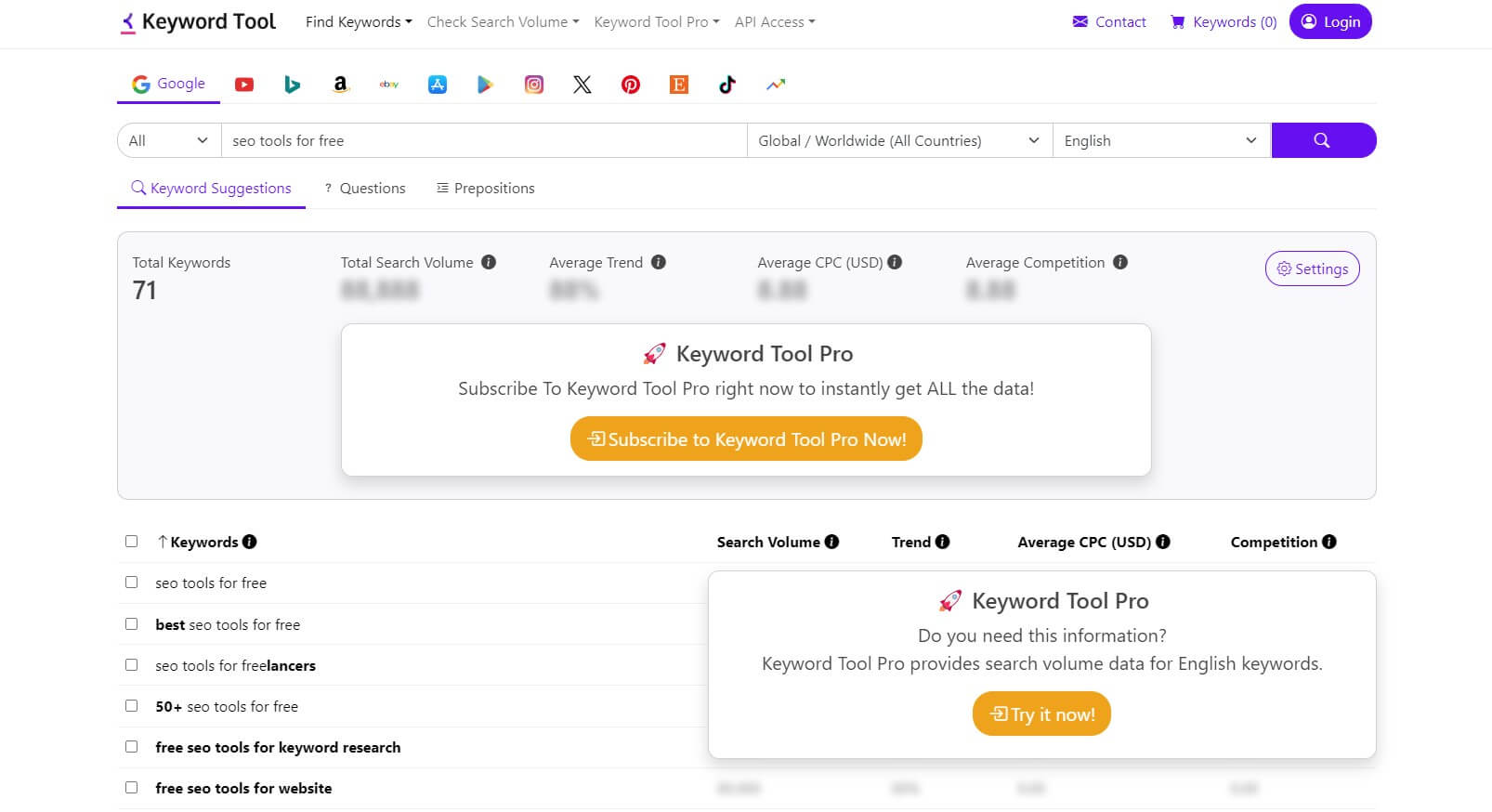
Keywordtool.io is a famous website for gathering a load of suggestions. It utilizes Google Search Autocomplete to deliver an eye-watering number of suggestions and ideas with their search volumes, trends, CPC, and competition levels.
This software will provide you with related questions and prepositions, letting you apply the location filter to tailor the experience to your needs. This way, you can even improve local SEO if you’re targeting the local market and serving users from your region.
What’s more, Keywordtool.io supports many search engines. Apart from Google, you can utilize Amazon, Bing, X, Instagram, and TikTok to find relevant terms. For a free tool, it’s impressive that you can select from multiple languages, which you won’t find often.
Keywordtool.io offers a premium version with more information for each suggestion. However, we think it’s quite expensive at $69 a month given its limited SEO capabilities compared to Semrush or SE Ranking, which is even cheaper than this one.
Again, we presented this keyword research tool as a free option and it’s great in this case.
10. AlsoAsked
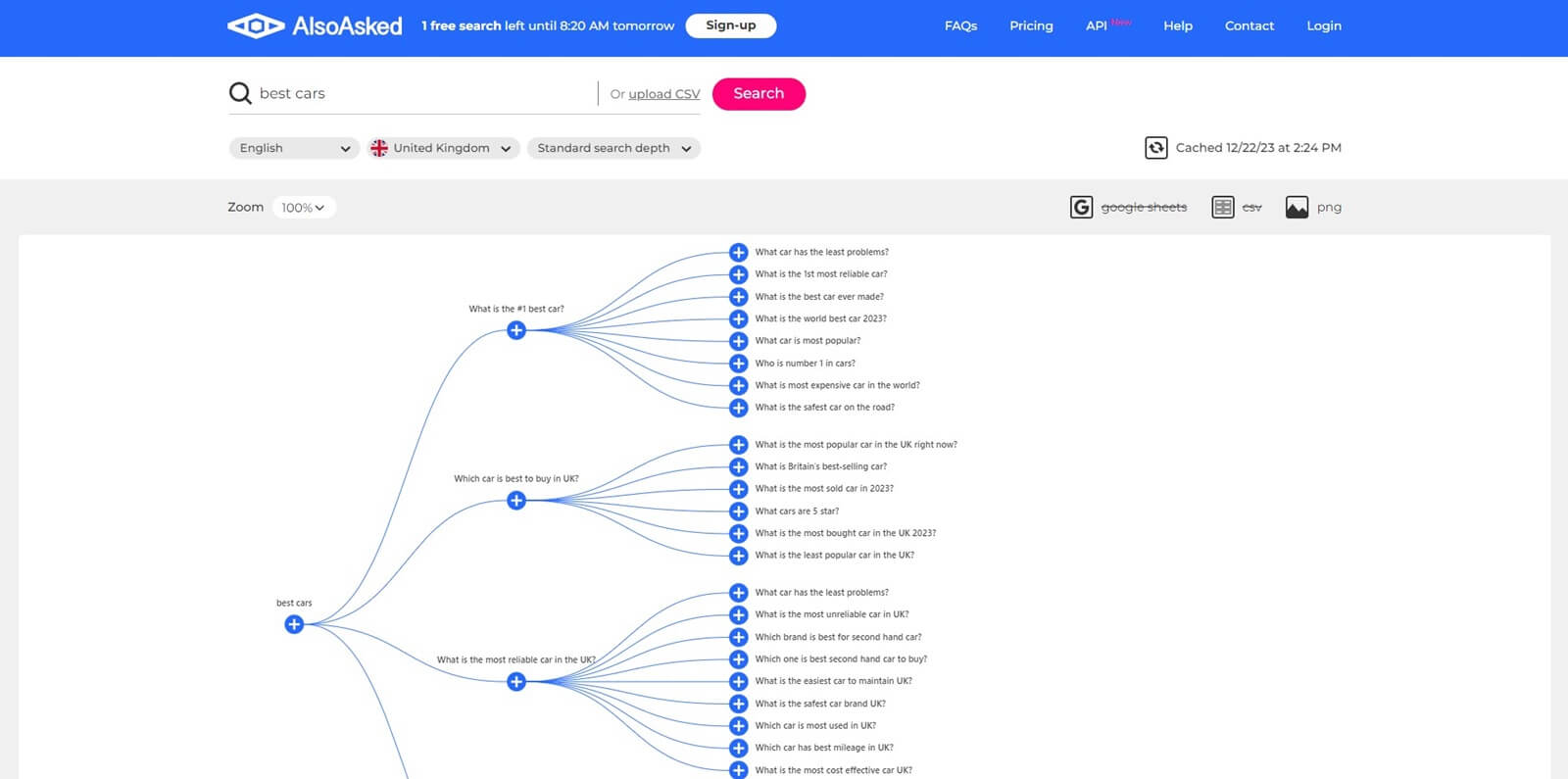
We left AlsoAsked for the end but that doesn’t mean we’re not fond of it.
AlsoAsked provides you with topic clusters to help you better comprehend the topic you’re writing about. Type in the search term and AlsoAsked will come with related questions.
You’ll be looking at a mind map that explains the way people search for the given term. For instance, when typing in “SEO tools”, AlsoAsked came up with the question of what are SEO tools for and then a few more questions that go more in-depth.
AlsoAsked will also provide at least 20 questions for you to think about and cover. By answering these questions, you’re covering the topic completely, thus, gaining higher topical authority needed to appear in the top 10 SERPs on Google.
However, AlsoAsked is fairly limited and allows for only a few searches per day, which can be discouraging. It offers a few premium plans that start at $12 a month and 100 monthly searches. More expensive plans offer API access and deep search functions.
Are they worth it? Well, if you’re already using Semrush, Ahrefs, Moz, or SE Ranking (paid), you likely won’t need AlsoAsked. The Basic plan at $12 should be enough if you want to get more topic clusters and perform in-depth keyword research.
How to Use Keyword Research Tools
You don’t have to be a renowned SEO expert to use a keyword research tool.
However, if you’re asking how to use one, we’d say it depends on the tool. Let’s take Semrush as an example. It offers a few tools that function differently.
The Keyword Magic Tool revolves around providing suggestions based on the search term. You’ll type in one keyword and get these suggestions. We then have the Keyword Overview tool, which analyzes one keyword and displays its parameters.
Semrush also lets you get suggestions based on your domain. This works by analyzing the domain and providing phrases and content ideas based on your niche. The entire SEO keyword research process revolves around two things:
- Analyzing individual keywords
- Getting keyword suggestions
Therefore, regardless of the tool you select, you’re going to be doing one of the two things.
We explained how to use these keyword research tools and as you see, it’s nothing overly complicated.
What Makes a Good Keyword Research Tool?
Selecting a proper tool for this vital SEO research shouldn’t be random and sporadic. To ensure we covered all the needs of our readers, we included a selection of paid and free keyword research tools. However, here’s what we looked for in all of them.
Lots of KW Information
SEO experts know the value of information. If you can gather an array of data for the keyword, you can better anticipate its success. Wasting time on a phrase that likely won’t rank well isn’t going to bring you any good.
To never miss a mark, we included tools like Semrush and SE Ranking. Their information pool is extremely large and includes important metrics such as difficulty, volume, SERP analysis, PPC analysis, CPC, trends, and many more.
We can say the same about paid versions of Moz and Ahrefs. Alas, their free keyword research tools are lacking in comparison, which is typical for free services. Browse our free SEO tools guide to see what we think of them.
Data Accuracy
Okay, so data accuracy is perhaps even more important. Semrush and SE Ranking get their data directly from Google, usually its Search Console or Analytics apps. These two provide first-hand information on keyword trends and rankings.
This way, you’re getting first-hand information about each key phrase, which, again, plays into the decision-making process. Should you try to rank for that word or try something else? You’ll find precise answers in our provided tools!
Ease of Use
As said, we don’t require you to be an SEO expert. We want you to be able to select the tool you want to use and start your research. For this reason, we included easy-to-use software like Semrush, SE Ranking, and Google Keyword Planner.
They will give you hundreds of suggestions for one phrase with all the relevant information attached. Another thing we looked for is information layout. Semrush uses beautiful graphs to outline trends, difficulty, and other parameters.
SE Ranking also looks stunning and divulges its information in an easy-to-grasp manner. This allows you to promptly get the information you need, decide on the next step, and start creating new content to complete in the ever-growing online space.
Credibility
Credibility is a mandatory factor in our selection. These services are usually very old and date back 10 or more years. Semrush started in 2008, for example, and in 2025, it’s still the most popular option. This speaks volumes about its credibility.
We can say the same about other options here, especially SE Ranking, Moz, and Ahrefs whose expertise helped millions of people around the world.
Other SEO Functions
Finally, we wanted to include as many versatile keyword research tools as possible. Yes, you need this function but you’d be more inclined to use other functions if they were there. Look at Semrush and compare it to SpyFu. You’ll see that it’s way more equipped!
That’s why SpyFu isn’t on this list of the best keyword research tools for 2025.
Semrush offers functions like site audits, domain analysis, PPC research, content marketing, local SEO, and dozens of others. SE Ranking has its Agency Pack for larger businesses, while Ahrefs and Moz have superb SERP analysis.
Some tools on this list are limited to keyword research but that’s because they’re free. However, by paying for some of them, you can still unblock their full array of features and cover every aspect of your SEO strategy – not just this one.
Conclusion
In 2025, it’s more vital than ever to use a powerful and robust keyword suggestion tool. Semrush, SE Ranking, and Ahrefs keep the bar high by providing us with some of the most effective keyword research tools we’ve seen.
They’re our favorites if you’re looking for all-rounders with all the SEO capabilities you’ll ever need. The latter part of our list consists primarily of free services that will do the job if you’re not overly demanding. They’re inferior but still stellar.
Our suggestion is to try Semrush and SE Ranking with their non-conditional free trials. They have a 14-day trial for testing their mighty features, while Ahrefs has a free keyword generator that can be squeezed for some excellent ideas and content inspiration.
Keyword research begins with a capable tool and now that you have 10 of them, what can we say? The world is yours!